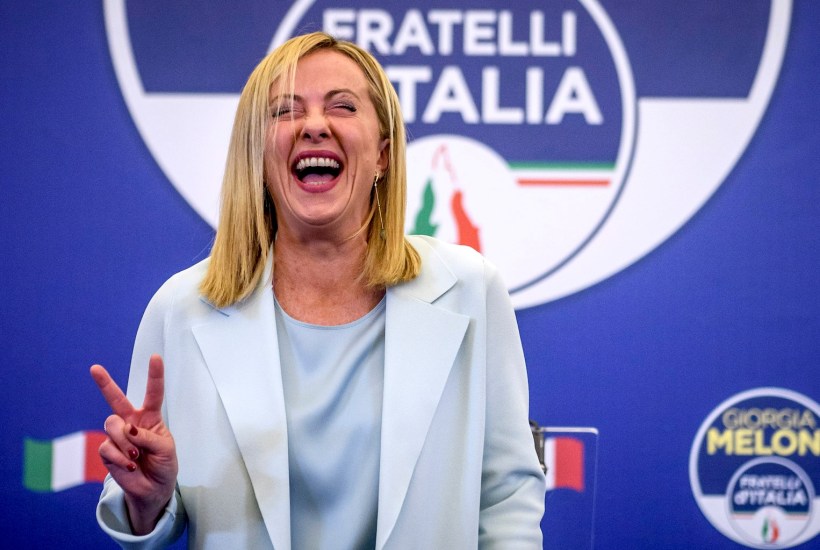Mario Draghi’s national unity government lost badly in yesterday’s Italian election – worse even than the polls predicted. Fratelli d’Italia, the main opposition party, was the big winner. Five Star, which pulled the plug on Draghi’s government, also gained. What we did not see is a big shift between left and right. The right coalition of Fratelli d’Italia, Lega, and Forza Italia, got 44 per cent. The really big movements occurred within the coalition. Giorgia Meloni’s FdI ended up with 26 per cent – way ahead of the published polls. Lega got only 9 per cent. The coalition is on course to secure a majority in both houses of parliament, though not the two-thirds majority needed to amend the Italian constitution. Meloni will almost surely be the next prime minister.
For Matteo Salvini, 9 per cent in the vote is a personal defeat. This is a serious underperformance compared to Lega’s result in 2018, not to mention the commanding heights they reached in the polls – as high as 37 per cent – the year after. Salvini has tried to broaden the party’s appeal by adopting a more overtly populist message and image, but this strategy has now definitively failed. Lega has even lost support in traditionally reliable regions, like Veneto, to FdI.
Outside of the coalition, Five Star will feel pleased with their result. The party has substantially underperformed on their 2018 result where the party secured around a third of voters. But compared to the 10 per cent average they were polling at when the election was called, the 15 per cent they have secured is solid. They have managed to come close to the centre-left Partito Democratico, who are on around 19 per cent, while also probably picking up a few constituencies in the south, a relative success for Giuseppe Conte. He will surely feel as if the result vindicates his role in Mario Draghi’s downfall in July. The strength of Five Star’s campaign also signals a way forward for the party, where they can balance their core identity with better tactical acumen and a sharper sense of focus.
It’s hard to tell exactly what will happen to Enrico Letta’s Partito Democratico. By all accounts, his strategy has been a failure. Burning bridges with would-be allies like Five Star rather than building them doomed the PD to defeat before the contest even began. Based on these results, an electoral coalition of the PD, plus a coterie of smaller left-wing parties, and Five Star could have come within a few percentage points of the right-wingers. They could have feasibly denied Meloni and her allies the Senate at the very least. His attack lines against her also failed to hit the mark.
Meloni has been the presumptive prime minister since Draghi’s unity government fell. Because of this, she and FdI have done a lot of work to assuage worried observers in financial markets and Brussels. Her finance minister will probably be an institutionally acceptable figure, either from within her coalition or externally. Her only jab at the EU was a mild pledge to renegotiate Italy’s recovery fund. FdI has also been one of the most vocally pro-Nato parties in the country.
Meloni and her party’s priorities are clear. Social issues, like Italy’s low fertility rate, same-sex adoption, or migration policies, are where Meloni has clearly defined viewpoints. She and her party also advocate a presidential system for Italy, though this is highly unlikely to materialise. Her thoughts on fiscal and economic policy do not extend far beyond cutting taxes by cutting welfare spending.
But there is little idea of how Meloni would act in a crisis. Her only government job so far has been as youth minister during Silvio Berlusconi’s final premiership. She has risen to prominence during her time as a politician through opposition. She will need to fight fires, including some potentially very large ones like a sovereign debt crisis or an escalation of the war in Ukraine. She will also need to deal with difficult coalition partners. Salvini, if he stays, could become hard to manage if he sees attacking Meloni from within as the only way to restore Lega’s flagging popularity. She will also probably be dependent on Berlusconi’s Forza Italia for her majority. If the going gets tough, he could abandon her for a national unity government.
In the longer term, Italy will have to reckon with the fact that voters’ faith in its political system is draining away. This election’s turnout was an all-time low of just under 64 per cent, a drop from 73 per cent at the last election. Italians are becoming increasingly frustrated with the state of the country and the failure of their politicians to do much about it.
Got something to add? Join the discussion and comment below.
Get 10 issues for just $10
Subscribe to The Spectator Australia today for the next 10 magazine issues, plus full online access, for just $10.
This article first appeared in the Eurointelligence morning news briefing. Sign up here.



















Comments
Don't miss out
Join the conversation with other Spectator Australia readers. Subscribe to leave a comment.
SUBSCRIBEAlready a subscriber? Log in